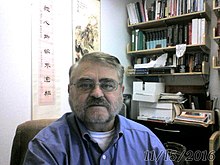J. Michael Spector
Jonathan Michael Spector is professor of Learning Technologies and Doctoral Program Coordinator at the University of North Texas [1] He was previously professor of Educational psychology of the University of Georgia, and professor of Instructional Systems at Florida State University.[2]
J. Michael Spector | |
|---|---|
 Michael Spector in 2016 | |
| Born | |
| Nationality | American |
| Alma mater |
|
| Scientific career | |
| Fields | Educational technology |
| Institutions | |
Spector's research focuses on intelligent support for instructional design, assessing learning in complex domains, and technology integration in education. He has authored over 150 publications in the field of educational technology, and edited the Handbook of Research on Educational Communications and Technology, and the Encyclopedia of Educational Technology.[2] He has been a visiting professor at several universities in China, India, and Malaysia and was a Fulbright research scholar at the University of Bergen.[3] He was a past president of the Association for Educational Communications and Technology.[3]
Spector was born in Pensacola, Florida, and earned a B.Sc. in International Affairs from the United States Air Force Academy in 1967, and a Ph.D. in Philosophy from the University of Texas at Austin in 1978.[3](subscription required)
Publications
- Lin, Lin; Spector, J. Michael (July 2017). The Sciences of Learning and Instructional Design. Routledge. p. 231. ISBN 978-1138924314. Retrieved 4 July 2020.
- Spector, J. Michael (June 2015). Foundations of Educational Technology. Routledge. ISBN 978-1138790278.
See also
References
- "J. Michael Spector UNT Profile". UNT Learning Technologies.
- Lin, Lin; Spector, J. Michael (11 July 2017). The Sciences of Learning and Instructional Design. Routledge. p. 231. ISBN 978-1138924314. Retrieved 4 July 2020.
- Shaughnessy, Michael F.; Fulgham, Susan M. (May–June 2015). "Interview with J. Michael Spector". Educational Technology. 55 (3): 60–63.CS1 maint: date format (link)
External links
- J. Michael Spector publications indexed by Google Scholar
- Learning Technologies at the College of Information at the University of North Texas
- College of Information at the University of North Texas